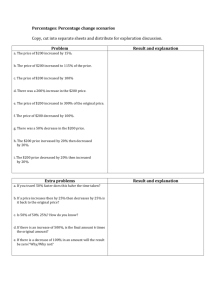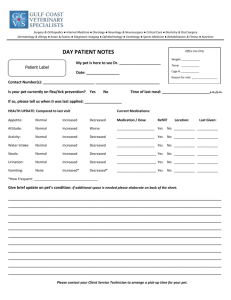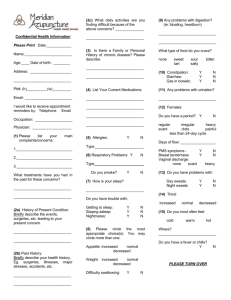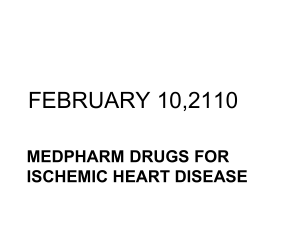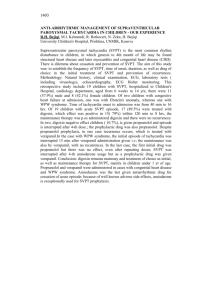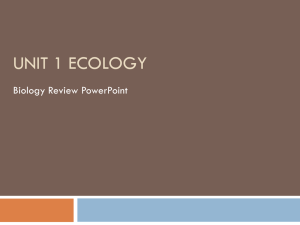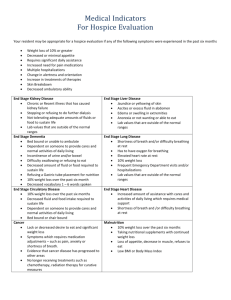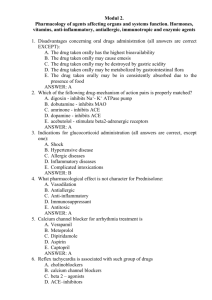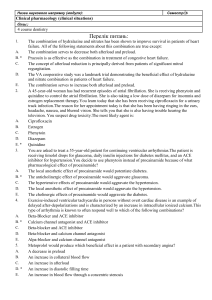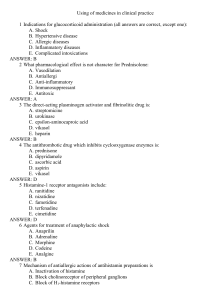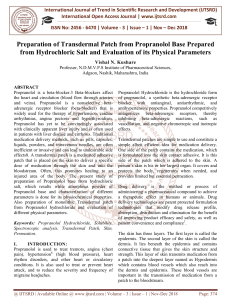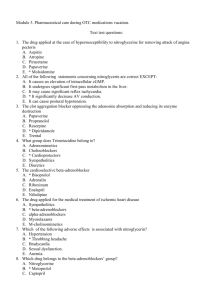1. Which of the following most directly describes the mechanism of
advertisement
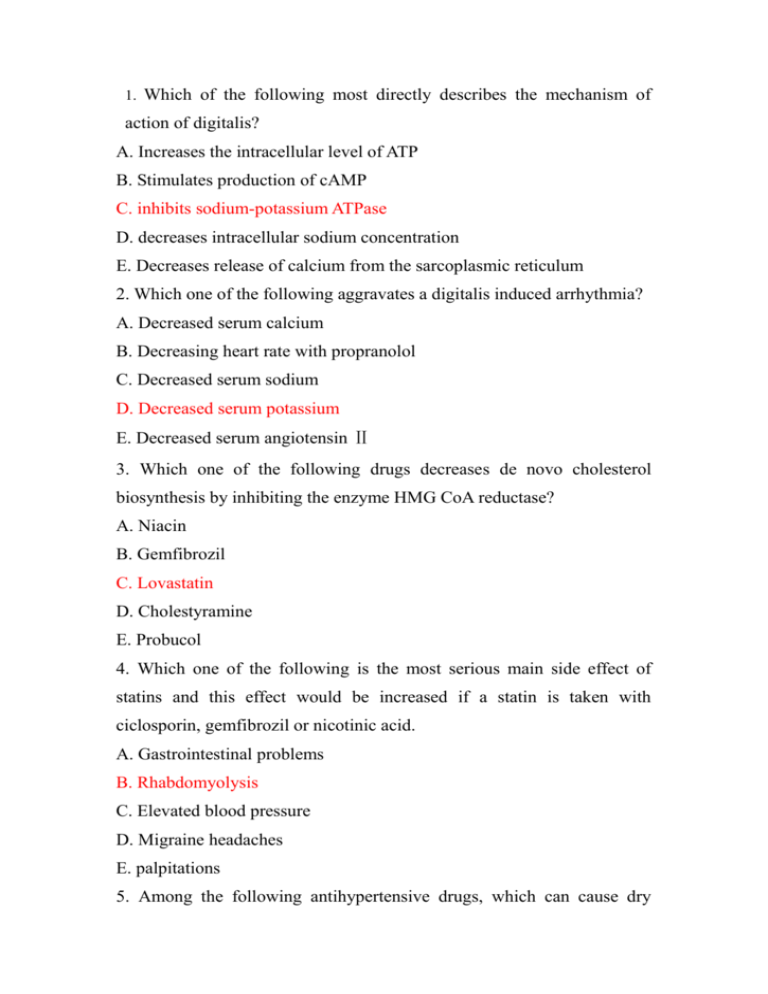
1. Which of the following most directly describes the mechanism of action of digitalis? A. Increases the intracellular level of ATP B. Stimulates production of cAMP C. inhibits sodium-potassium ATPase D. decreases intracellular sodium concentration E. Decreases release of calcium from the sarcoplasmic reticulum 2. Which one of the following aggravates a digitalis induced arrhythmia? A. Decreased serum calcium B. Decreasing heart rate with propranolol C. Decreased serum sodium D. Decreased serum potassium E. Decreased serum angiotensin Ⅱ 3. Which one of the following drugs decreases de novo cholesterol biosynthesis by inhibiting the enzyme HMG CoA reductase? A. Niacin B. Gemfibrozil C. Lovastatin D. Cholestyramine E. Probucol 4. Which one of the following is the most serious main side effect of statins and this effect would be increased if a statin is taken with ciclosporin, gemfibrozil or nicotinic acid. A. Gastrointestinal problems B. Rhabdomyolysis C. Elevated blood pressure D. Migraine headaches E. palpitations 5. Among the following antihypertensive drugs, which can cause dry cough easily? A. verapamil B. captopril C. losartan D. propranolol E. nifedipine 6. The mechanism of anti-hypertensive effect of losartan is: A. decrement of renin activity B. inhibition of angiotensin converting enzyme C. blockade of the angiotensin Ⅱ receptors D. increment of bradykinin synthesis E. causing vasodilation directly 7. The antihypertensive mechanism of diuretics for long-term treatment is: A. increasing water and sodium excretion from the kidneys. B. decreasing sodium concentration in vascular smooth muscle cell C. increasing the activity of rennin D. decreasing the activity of rennin E. decreasing the secretion of aldosterone 8. Which of the followings is NOT the characteristics of ACEI ? A. it can be used in mild, moderate and severe hypertension B. it does not cause reflective quick heart rate C. it not only improves life quality, but also decreases mortality D. it will not cause disorder of lipid metabolism E. it will not affect glucose metabolism 9. Captopril can do all of the following EXCEPT A. inhibiting ACE B. causing dry cough C. inhibit the formation of angiotensin Ⅱ D. promote the excretion potassium E. increase bradykinin concentration in the blood 10. Which of the following antianginal drugs is harmful to patients with variant angina? A. Verapamil B. Nifedipine C. Nitroglycerin D. Propranolol E. Aspirin 11. Which of the following drugs is not suitable to treat the patient with angina pectoris accompanied with asthma? A. Nifedipine B. Propranolol C. Nitroglycerin D. Verapamil E. Isosorbide dinitrate 12. The mechanism of vasodilation of nitroglycerin is A. vasodilating directly B. blocking α receptor C. producing NO D. stimulating β2 receptor and causing vasodilation E.stimulating adenyl cyclase to increase intracellular cAMP concentration. 13. Which of the following drugs is the best choice for variant angina? A. propranolol B. nitroglycerin C. calcium channel blocker D. carvedilol E. procainamide 14. Which of the following statements about the treatment of chronic heart failure is wrong? A. Patients with evidence of fluid retention should receive a diuretic. B. Treatment with an ACE inhibitor and a β-R blocker should be initiated and maintained unless specifically contraindicated. C. Digoxin may be added if needed to reduce symptoms or to slow the ventricular repsonse in patients with rapid atrial fibrillation. D. Patients with severe heart failure should also receive a β-R blocker E. Spironolactone may reduce mortality in patients with severe heart failure 15. The followings belong to the adverse effects of ACE inhibitors EXCEPT: A. hypotension B. dry cough C. hyperglycaemia D. hyperkalemia, E. angioedema 16. The therapeutic action of β-adrenergic receptor blockers such as propranolol in angina pectoris is believed to be primarily the result of A. Reduced production of catecholamines B. Dilation of the coronary vasculature C. Decreased requirement for myocardial oxygen D. Increased peripheral resistance E. Increased sensitivity to catecholamines 17. A 58-year-old patient with a history of hypertension and congestive heart failure administrating some drugs, now he complains of nausea, blurred vision and bradycardia, intoxication of glycoside is suspected, then digoxin is stopped, which of the following drugs also must be stopped? A. nifedipine B. diazoxide C. hydrochlorothiazide D. prazosin E. clonidine 18. Which of the following antiatherosclerotic drugs has antioxidant effect? A. Acipimox B. Gemfibrozil C. Lovastatin D. Cholestyramine E. Probucol 19. All of the following measures can be used in the treatment of digoxin-induced arrhythmias except A. stopping digoxin administration B. diuretic agents such an furosemide is used to improve excretion C. phenytoin administration D. atropine administration E. lidocaine administration 20. Which of the following is not the adverse reaction of cardiac glucosides A. anorexia, nausea, vomiting, diarrhea B. blurred vision C. tachycardia D. bradycardia E. hyperkalemia Questions 1. Why are the ACEI used as regular therapeutic drugs in the treatment of CHF at present? Answers: 1)Inhibit ACE (1) decreased the formation of angiotensin II both in circulation and local tissue (2) decreased aldosterone secretion and decreased salt & water retention (3) decreased degradation of bradykinin 2) reduce sympathetic activity by decreased angiotensin-mediated norepinephrine release 3) Inhibit proliferation and hypertrophy of cardiac myocytes and vascular smooth muscle cells, reverse myocardial and vascular remodeling 4)ACEI are used as first-line agents for CHF therapy and decrease mortality, prevent and reverse myocardial remodeling. no reflex tachycardia (unlike vasodilators), therefore safe for use in persons with ischemic heart disease. 2. (1) (2) (3) (4) (5) Please describe the clinical uses of β-receptor antagonists. hypertension CHF Angina pectoris Arrhythmia Others: hyperthyroidism r
